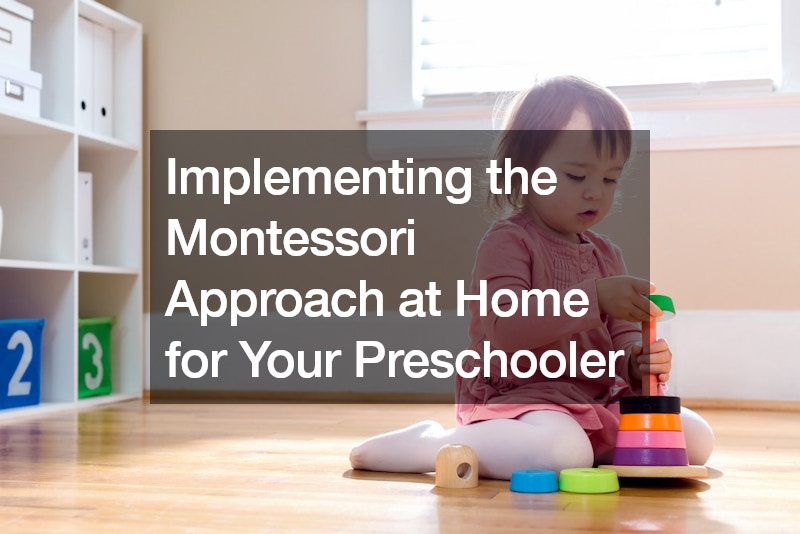
The Montessori approach at home is a wonderful way to foster independence, curiosity, and a love for learning in your preschooler. By creating a Montessori-inspired environment in your own house, you can help your child develop essential skills and abilities that will benefit them for a lifetime.
Implementing Montessori principles at home can be a fulfilling and rewarding experience for both you and your child. Below, we’ll guide you through the key aspects of the Montessori approach and provide practical tips on how to incorporate it into your daily routine whether your child attends a Montessori school or not!
Whether you’re a stay-at-home parent, a working parent, or a caregiver looking to enhance your child’s learning experience, the Montessori approach at home offers a holistic and child-centered approach to education that focuses on the individual needs and interests of each child.
What Is the Montessori Approach?

The Montessori approach at home is based on the educational philosophy developed by Dr. Maria Montessori, an Italian physician and educator. Dr. Montessori believed in creating a child-centered learning environment that promotes independence, freedom within limits, and a hands-on approach to education.
One of the key principles of the Montessori approach is the belief that children are naturally curious and eager to learn. By providing them with the right tools, materials, and guidance at a Montessori preschool and at home, children can engage in self-directed exploration and discovery, leading to a deeper understanding of the world around them.
The Montessori approach also emphasizes respect for the child, recognizing their unique abilities, interests, and pace of development. It encourages children to take an active role in their learning journey, fostering a sense of responsibility and self-motivation.
How Can I Create a Montessori Environment at Home?
Setting up a Montessori-inspired learning space in your home is the first step towards implementing the Montessori approach for your preschooler. Create a dedicated area for your child’s activities, equipped with child-sized furniture, shelves for materials, and open space for movement. You may even hire an interior house painter to ensure the space has fun wall colors!
Choose Montessori materials that focus on practical life skills, sensorial exploration, language development, and math concepts. These materials should be age-appropriate, engaging, and accessible to your child, allowing them to explore and learn at their own pace.
Establish a daily routine that includes time for independent play, group activities, outdoor exploration, and quiet reflection. Consistency and structure are key components of a Montessori environment, helping children feel secure and confident in their daily activities.
How Can I Encourage Independence?

Teaching self-care skills is a fundamental aspect of the Montessori approach at home. Encourage your child to dress themselves, prepare snacks at your granite countertop, and clean up after themselves, fostering a sense of independence and self-reliance.
Empower your preschooler to make decisions and choices in their daily activities. Offer them opportunities to choose their activities, select materials, and plan their day, allowing them to develop critical thinking skills and personal responsibility.
Promote a sense of responsibility in your child by involving them in household tasks, such as setting the table, watering plants as part of your family’s lawn care routine, or sorting laundry. Engaging children in meaningful activities helps them develop a sense of purpose and contribution to the family.
What Are Some Montessori Activities for Preschoolers?
Practical life activities, such as pouring, sorting, and threading, help children develop fine motor skills, hand-eye coordination, and concentration. These activities also teach important life skills, such as organization, problem-solving, and independence.
Sensorial activities focus on stimulating the senses and exploring the physical world. Activities like matching textures, identifying smells, and categorizing sounds help children develop sensory awareness, observation skills, and a deeper understanding of their environment.
Language and math activities in a Montessori environment are designed to promote literacy, numeracy, and critical thinking skills. Through hands-on materials and engaging activities, children learn to recognize letters, sounds, and numbers, setting a strong foundation for future learning in these areas.
How Can I Support my Child’s Learning and Development?

Observe and follow your child’s interests, strengths, and challenges to tailor their learning experience accordingly. By paying attention to your child’s cues and preferences, you can provide them with personalized activities and materials that meet their individual needs.
Provide opportunities for exploration and discovery in various environments, such as nature walks, museum visits, and community outings. Encourage your child to ask questions, make observations, and engage with their surroundings, fostering a sense of curiosity and wonder.
Encourage a love for learning by modeling a positive attitude towards education, creativity, and problem-solving. Engage in educational activities, read books together, and celebrate your child’s achievements to instill a lifelong passion for learning and personal growth.
How Do I Address Socialization in a Montessori Setting?
Encourage peer interactions by organizing playdates, attending playgroups, or joining social clubs for young children. Promote opportunities for your child to socialize, collaborate, and communicate with their peers, fostering social skills and emotional intelligence.
Teach conflict-resolution skills by modeling positive communication, active listening, and problem-solving strategies. Help your child navigate social situations, manage disagreements, and negotiate with others, building their capacity for empathy, compromise, and respect.
Promote empathy and respect towards others by discussing emotions, perspectives, and diversity with your child. Teach them the value of kindness, tolerance, and understanding, encouraging them to be compassionate and considerate towards their peers and community members.
How Can I Evaluate Progress?

Use observation as a tool to assess your child’s growth, development, and interests in a Montessori setting. Pay attention to their engagement, concentration, and problem-solving skills during activities, noting their strengths and areas for improvement.
Document and reflect on your child’s learning journey by keeping a journal, taking photos, or creating a portfolio of their work. Review these records regularly, celebrate their achievements, and set new goals for their continued learning and development.
Communicate with teachers, experts, and other caregivers to gain insights into your child’s progress and receive feedback on their educational experience. Collaborate with professionals, attend parent-teacher conferences, and seek guidance from Montessori experts to support your child’s growth and success.
What Are Common Challenges When Implementing the Montessori Approach at Home?
One common challenge when implementing the Montessori approach at home is difficulty in maintaining consistency and structure in daily activities. It can be challenging to balance work, household responsibilities, and childcare while following a Montessori routine.
Another challenge is struggling with letting go of control and allowing your child to take initiative in their learning journey. It can be tempting to intervene, direct, or correct your child’s activities, but it’s important to trust in their capabilities and respect their independence.
Finding a balance between the Montessori approach and other parenting styles or educational philosophies can also be a challenge. It’s essential to align your values, goals, and strategies to create a harmonious learning environment that supports your child’s holistic development.
How Can I Incorporate Montessori Values in Everyday Activities?
Encourage mindful and purposeful living by incorporating Montessori values into your daily routines, such as meal preparation, household chores, and family activities. Engage your child in meaningful tasks, promote independence, and model respect for the environment.
Show respect for your child by acknowledging their efforts, listening to their ideas, and valuing their contributions. Create a supportive and nurturing environment where your child feels heard, seen, and appreciated, fostering their self-esteem, confidence, and sense of belonging.
Promote a love for nature and the environment by exploring outdoor spaces, gardening, and engaging in eco-friendly practices as a family. Teach your child the importance of sustainability, conservation, and respect for the planet, instilling a sense of responsibility and stewardship for the environment.
What Resources Are Available for Parents Interested in Montessori?

Books on Montessori philosophy, such as “The Absorbent Mind” by Maria Montessori, “Montessori from the Start” by Paula Polk Lillard, and “Montessori Today” by Paula Polk Lillard, offer valuable insights and practical tips for implementing Montessori principles at home.
Online courses and workshops on Montessori education, child development, and parenting strategies provide accessible and comprehensive resources for parents looking to deepen their understanding of the Montessori approach. Platforms like MontessoriAMI and MontessoriGuide offer online training programs and educational materials for parents and educators.
A local Montessori school is a valuable source of support, guidance, and networking opportunities for parents interested in the Montessori approach. Connect with like-minded families, attend parent meetings, and participate in community events to learn more about Montessori education and find resources in your local area.
How Does the Montessori Approach Support My Child’s Emotional Development?
The Montessori approach at home focuses on promoting emotional intelligence, self-regulation, and positive social interactions in young children. By providing a supportive and nurturing environment that respects the child’s emotions and needs, the Montessori approach helps children develop empathy, resilience, and emotional well-being.
Encouraging self-regulation is a key aspect of the Montessori approach. By teaching children how to manage their emotions, impulses, and behaviors in a constructive way, parents can help children build essential skills for self-control, conflict resolution, and personal growth.
Teaching conflict resolution skills is an integral part of the Montessori approach. By modeling positive communication, active listening, and problem-solving strategies, parents can help children navigate social interactions, manage disagreements, and build healthy relationships with others.
How Do I Introduce the Montessori Approach if My Child’s Already in a Traditional Preschool?
If your child is already attending a traditional pre-k class, you can gradually introduce Montessori principles at home to supplement their learning experience. Create a Montessori-inspired environment in your house, provide age-appropriate materials and activities, and incorporate Montessori values into your daily routines.
Collaborate with teachers, caregivers, and educators at your little one’s early learning childcare center to align your child’s learning experiences between school and home. Share your interest in the Montessori approach, discuss ways to integrate Montessori principles into your child’s daily routines, and seek guidance on how to support their holistic development both in and out of the classroom.
Implement Montessori at home to complement your child’s educational journey in a traditional daycare center or school. By providing a balanced and holistic approach to learning, you can enhance your child’s cognitive, physical, and emotional development, creating a well-rounded educational experience for them.
How Can I Stay Connected With the Montessori Community and Further My Knowledge?

Joining Montessori parenting groups, such as Montessori Moms or Montessori Dads, can provide a supportive and informative network of like-minded parents. Connect with other families, share resources, and exchange ideas on how to implement Montessori principles at home for your preschooler.
Attending Montessori conferences and workshops, both online and in-person, offers valuable opportunities to learn from experts, educators, and researchers in the field of Montessori education. Participate in lectures, discussions, and hands-on activities to deepen your knowledge of the Montessori approach and connect with other members of the Montessori community.
Engaging with Montessori experts and educators, such as certified Montessori teachers, school administrators, and child development specialists at a local private school, can provide personalized guidance and support for implementing the Montessori approach at home. Seek advice, ask questions, and collaborate with professionals to enhance your child’s educational experience and personal growth.
Implementing the Montessori approach at home for your preschooler offers a unique and valuable opportunity to support your child’s learning and development in a holistic and child-centered manner. By creating a Montessori-inspired environment, encouraging independence, fostering social skills, and promoting emotional well-being, you can help your child thrive and succeed in their early years.
Embrace the key principles of the Montessori approach, such as respect for the child, freedom within limits, and hands-on learning, to create a nurturing and engaging environment that cultivates curiosity, creativity, and a love for learning. Stay connected with the Montessori community, seek resources and support, and continue to deepen your knowledge of the Montessori approach to enhance your child’s educational journey and personal growth.
Whether you’re a stay-at-home parent, a working mom or dad, or a caregiver looking to provide the best possible education for your preschooler, the Montessori approach at home offers a rewarding and enriching experience that can benefit your child for years to come.


